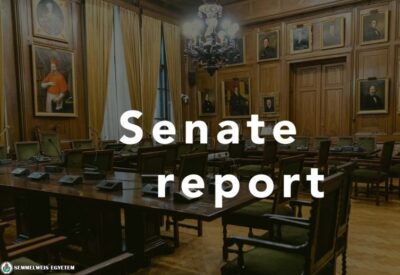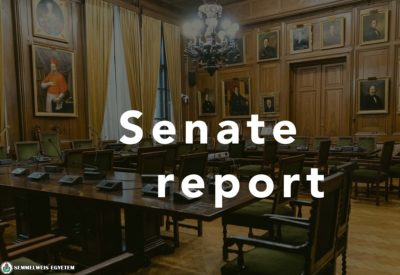The Senate voted on its work plan for spring 2023. Habilitation Regulations have been amended, according to which the Habilitation Committee may have at least 4 but no more than 7 members instead of the previous 7, who are habilitated external experts with an academic degree and who are not employed by the university. The aim of the change was to make university rules more flexible. The decision allows the habilitation procedure to be conducted in English, German and Hungarian as well.
The panel voted in favour of amending certain provisions of the Organizational and Operational Rules (SZMSZ). Staff Regulations have been amended on several points, including the integration of the statutory provisions on leave, which entail the obligation to draw up an annual leave plan. Under the Labour Code, the employer is obliged to keep up-to-date records of working and rest time, and to create an internal regulatory environment to ensure that employees can exercise their right to rest and that leave does not accumulate. Provisions on unpaid leave, availability, and exemption from duty, which previously appeared in separate regulations, have also been incorporated. The conditions for adjunct appointments have changed: due to the revision of healthcare service, the conditions no longer include clinical experience as a head of department or on-call manager. The rules on the procedure for applying for teaching and research posts and for the appointment of heads of teaching and research departments have been clarified. The decision added a conflict-of-interest framework to the SZMSZ, which was necessary due to the amendment of the law on the Public Interest Trusts Act.
Admission rules have been amended to include the admission procedure for the specialized further training „Mental hygiene in the workplace” at the Institute of Mental Health, Faculty of Health and Public Administration. A seventh examination option has been introduced in the Study and Examination Regulations (CER). Technical legal amendments were made to the organizational structure of the Directorate General for Economic Affairs, the term “county” was changed to “parish” in the SZMSZ, the legal status of the Data Protection Officer was regulated, and added a provision on the annulment of votes regarding the election of a rector candidate.
A new optional course, Colorectal Day 2023, is introduced in conjunction with the event organized by the Department of Surgery, Transplantation and Gastroenterology on 3 March 2023. Students can earn 1 credit for participating online in the 8-hour program.
The curriculum of the postgraduate English-Hungarian and German-Hungarian translator and interpreter training in health sciences at the Department of Languages for Specific Purposes has been amended. As a result, further knowledge embedded in the training of health science translators and interpreters (e.g. EU studies, intercultural, legal and ethical knowledge, project skills) has been integrated thematically into the courses providing professional language development. The 2019/2020 model curriculum of the specialization in healthcare administration within the Bachelor’s course in healthcare organization at the Institute of Digital Health Sciences, Faculty of Health and Public Administration was also amended, which was necessary due to the changes in the National Act on Higher Education (Nftv.) concerning language examinations.
As decided by the Senate, three new compulsory optional courses will be introduced at the Asklepios Campus Hamburg from the second semester of the academic year 2022/2023: Neurosurgery, Personalized Medicine in Oncology and Hematology, and Student Polyclinic Module III. From the second semester of the academic year 2022/2023, the Department of Obstetrics and Gynaecology will introduce Assisted Reproduction as a compulsory optional subject, which has been taught in English and German so far.
The report on the work of the Standing Committees established by the Senate with university-wide powers was approved. Two new committees also reported on their activities last year: the University Innovation Committee and the Vocational and Continuing Education Operative Committee.
The board decided on the awarding of the “Good Student – Good Athlete” distinction, the awarding of the “Outstanding Educator in the Academic Profession” distinction,, and also reviewed current applications for teaching and research positions.
Under the „Miscellaneous” agenda item, the Senate decided on the expansion of the university’s real estate assets. This involves the purchase of a 30 sqm property in the immediate vicinity of the Heart and Vascular Centre of Városmajor.
Ádám Szabó
Translation: Viktória Kiss
Photo: Attila Kovács – Semmelweis University (illustration)


